#spiteful-studying
Text
Me in 2019: Hey
The Magnus Archives: You are ace
Malevolent: You are ace
The Magnus Protocol: You are ace
Me: I am ace
#what did they put in these podcasts#spiteful musings#the podcaster to ace person pipeline needs to be studied#tma#the magnus archives#magpod#malevolent#malevolent podcast#tmagp#the magnus protocol#ace#aroace#aromatic#asexuality#aromantic#acespec
877 notes
·
View notes
Text
Aight I did it
Luis color palette and general skin tone study:
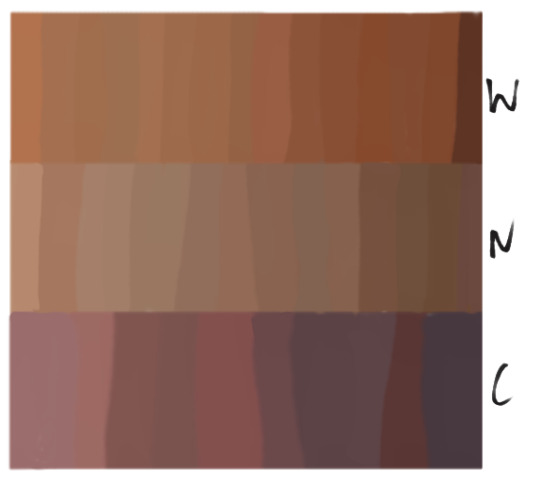
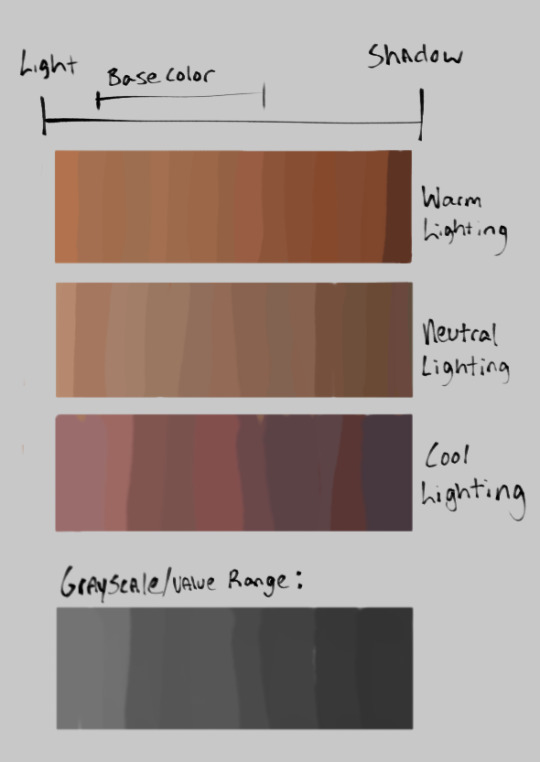
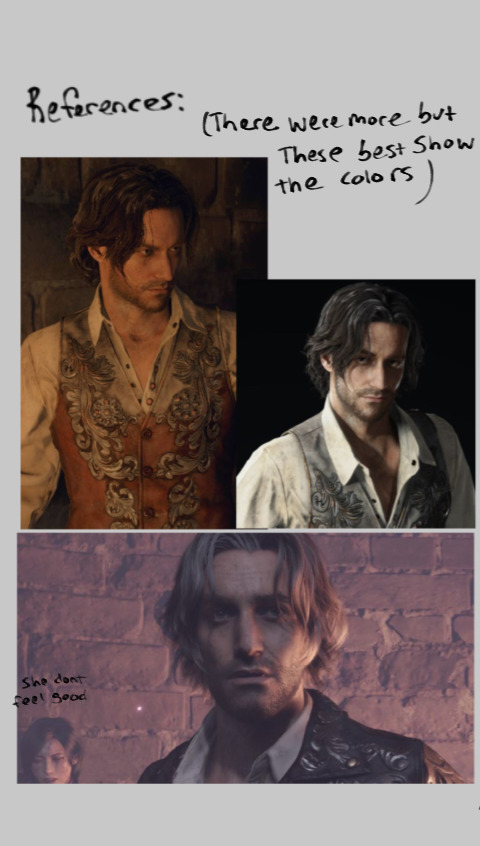

As well as some personal studies of his nose:


#finally got around to doing these#some of my handwriting is probably illegible so i apologize#luis serra#resident evil 4#i started this out of spite but i actually learned new stuff lmaoooo#visual study
216 notes
·
View notes
Text
in light of recent canon academic conversations, riz adaine gorgug study sessions have never been more real to me. gorgug helps riz + adaine get out of their own heads when they’re overworking themselves, riz + adaine help gorgug with alternative studying methods because he learns best through visuals + experience. fabian’s there occasionally when he has a particularly difficult assignment/test but he makes them all swear never to speak of it in order to protect his “image.” kristen has shown up exactly twice: once for advice on a group project that was two months overdue & once to just lay on the floor and relax for an hour before leaving. fig didn’t know the study sessions were happening until sophomore year & now keeps getting monthly bans because every time she shows up she ends up accidentally distracting riz + adaine. also, sometimes after/in the middle of really long study sessions riz adaine & gorgug go to basrar’s together to unwind but fabian kristen & fig Are Not Invited (they do still text to ask if anyone wants something brought back from basrar’s. they’re not heartless, after all).
#anyways that’s the post. study trio u r real in my heart#fantasy high#dimension 20#fhjy#gorgug thistlespring#adaine abernant#riz gukgak#fabian seacaster#kristen applebees#fig faeth#the bad kids#riz adaine gorgug trio who actually care about academics u r so dear to me. only bad kids who regularly do homework#adaine & riz both ‘ditch’ but adaine asks for her coursework beforehand + riz is usually getting rogue extra credit for sneaking out#gorgug has never ditched school in his life except for Urgent World Saving. he was doing his hw on the sig figs tour bus <3#i’m convinced fabian also cares to a degree but not enough to genuinely try hard. except out of spite. hence the study session visits#fabian both regularly cheats on homework & thinks getting a hard assignment & not doing well is ‘losing’#kristen has probs had a gradual academic falloff through high school due to just the amount of stuff that happened in her life.#like who has the mental energy to care about school when Literally Everything Else was going on… me too kristen me too#i think middle school fig didn’t care about school but still showed up + tried but immediately stopped giving a shit once her horns came in#& so here we are… anyways bad kids i love you
174 notes
·
View notes
Text
another huge problem with viv's writing is she was so damn impatient to just get to the part where the status quo gets shaken up and revel in it she decided to just fucking teleport there and failed to spend any time at all establishing a status quo TO be shaken up and so literally nothing in the show feels earned and everything feels rushed and confusing constantly as the tracks get laid in front of the train as its rolling
this is something i call "narrative speedrunning" and it is something you literally can never go back and fix, and that's a big part of why heckuva badshow is kind of unsalvageable and was doomed to be from the very beginning, which, like,
[mr krabbs voice]
i warned ye!
#hhhhverse tag of spite#the truth seekers episode is hilarious for this#like#time to resolve moxxie's character arc about being too meek and not speaking his mind to blitz!#what character arc. he doesn't even have that issue. we have literally never seen him back down from speaking his mind#he just get buttmonkey'd whenever he does. and then he still does it?#him bitching and objecting to what blitz does and says is what. 90% of their dialogue#the pilot Opens with him arguing with blitz. the first episode was him defying blitz Repeatedly. he talks back All The Time.#what the fuck are you talking about Big Sad Emotional Heart to Heart moment#you literally havent shown us any of the shit you are making such a big deal about resolving in this scene?? i feel fucking nothing???#hello???#i never watched this show for fun but to Study It it's like a How To Not Guide for SO MANY things holy shit
167 notes
·
View notes
Text
the way crocodiles whole body came out of that sand blast he used to protect luffy and jimbei at marineford lit keeps me awake at night dude so you mean to tell me that croc used himself in the form of a sand blast as a body shield for them. Against the dude that can turn himself into MAGMA. risked instant death by body turning into glass. he just sent up sand on its own for ace but for luffy and jimbei he turned his literal body into a defense like that sand that shot akainu WAS CROCODILE. do you understand the insanity. do you understand
#i have GOT to study this mans brain i might actually vomit#no amount of “he just wanted to spite the marines” will convince me thats the reason im sorry#TJERE JUST HAS TO BE MORE TO IT#one piece#sir crocodile#monkey d luffy
123 notes
·
View notes
Text
Controversial opinion #678:
The mantle of Batman should not be passed on but instead die with Bruce Wayne.
I mean, who should it go to? Nightwing is who Dick Grayson is, and a completely different brand from Batman. He has the kind of trust and respect as a leader within the superhero community that Batman just doesn't. He should lead the JLA one day as Nightwing. It's insulting to him to think that the Batman mantle is a promotion. Few other people can carry the name of Batman but no one else is worthy of Nightwing.
Jason? The day he wears the Bat's cowl is the day he loses everything that makes him Jason Todd, whether or not he gives up killing. He's supposed to be a renegade of the mission, a counterbalance in values and methods to the Bat, not become him.
Tim? It would consume him completely. Dick is at his best when he's surrounded by a diverse team of people, but Tim straight up needs it. Preferably outgoing, expressive, extroverted and sunny ones that are as unlike him as possible. Being Batman would make him lose himself inside his own head. The last thing this kid needs is more incentive to be manipulative and self-sacrificing.
Cass is honestly the best contender, not least because the cowl wouldn't weigh her down but emancipate and uplift her. The only reason I don't think she should be Batman is because I personally feel she supercedes Bruce in everything his emblem stands for. She should be The Bat - all the essence of guardianship and protection and terror of the night and none of the (let's face it - manpaining) martyrdom. As for the cerebral and leadership aspects of the Batman mantle, I think Cass would be a good leader when the situation calls for it, but I don't know whether she'd thrive in the role. She's a deeply intuitive and empathetic person; the emotional distance and hard choices for the greater good she'd have to make would eat at her more than it would the others. Doing anything "for the greater good" feels anathema to Cass's nature. Her profound and unfettered compassion is her strongest virtue.
Stephanie–what. No. Lmao. She's Hope at the bottom of Pandora's Box. Never that.
Becoming Batman would be the worst for Damian, because the true actualisation of his character is in freeing himself of his parental mold. He only wants to be Batman to prove himself good enough, to be accepted and chosen and trusted, his existence validated. But that's just chasing a mirage, because those insecurities exist chiefly within himself. If he was Batman they would just be exacerbated, condemned to operate forever in his father's shadow, always trying to live up to the legacy of his blood and a mission he never chose for himself.
I don't follow the reboot comics at all so I don't know much about Duke, but it seems the whole point of him is that he's the one who is expressly not supposed to be Batman. The only one of Gotham's heroes that lives in the light of day, never condemned to the shadows.
More than anything, though, the point of Batman's mission is for his role to become obsolete. If the world still needs a Batman by the time Bruce is forced to hang up his cape, then it means that he's failed.
#batman#batfamily#bat meta#bruce wayne#dick grayson#nightwing#jason todd#red hood#tim drake#red robin#cassandra cain#black bat#batgirl#stephanie brown#spoiler#damian wayne#robin#character study#spite waffle
2K notes
·
View notes
Text
you can’t control whether you’re the smartest person in the room, but you can be the one that cares the most. engagement, grit, and drive is what it comes down to in the end. so go ahead, prove them wrong.
#spite is the best motivation fight me#quote#study#studyblr#studying#school#university#medblr#law#motivation#discipline#inspiration#inspirational quote#motivational quote#academia#studyspo#studyinspo#goals#productivity
1K notes
·
View notes
Text
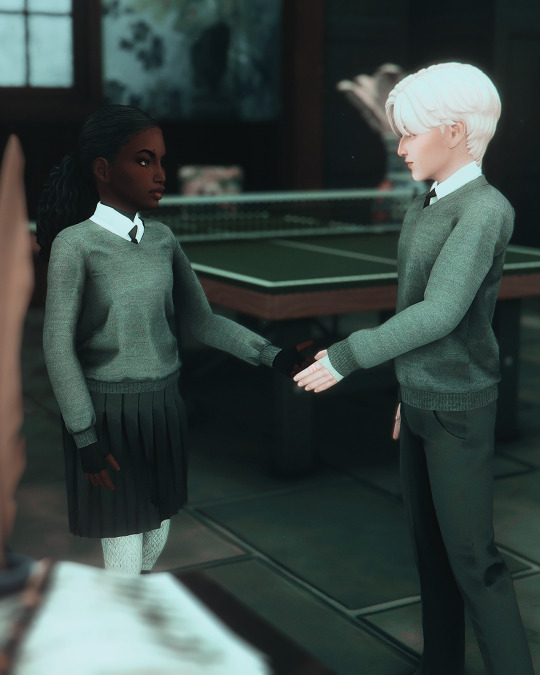


how did you two meet?
she offered me her hand.
#simblr#the sims 4#sims 4#ts4#ts4 edit#ts4 screenshots#echthroi#matthias evanoff#imani haut#river dipping#🦇#they're 11-12 15-16 18-19 here respectively :)#first photo: imani introducing herself to the creepy boy studying alone#second pic: matthias reaching out to grab imani's hand one last time before his parents take him away#(if you read that little ask i got abt matthias's backstory this is when they took him out of school bc of his father's ego and health)#third pic: matthias's eighteenth birthday. imani showed up to take him away from the awful school his mother sent him to out of spite.#(note the uniform change)#he was finally able to leave after turning eighteen. it was one of those ''reformation'' schools#where they've even got the law enforcement in on it yk 'bring them back to us if you find them''#they hadn't seen each other in person for three years. she showed up at the break of dawn to get him. ugh.#um. anyway this took me forever. happy late birthday matthias <3 here's a tribute to the first person to show you love <3#HE'S GAY. just fyi. if that wasn't clear. i know this is kinda romantic looking but it's not djknhfkjnh
310 notes
·
View notes
Text
I owe my academic career to my rival. I’ve never spoken to her, not one time, but she is in every single one of my classes (suspicious) and sometimes the only way I can bring myself to study is the fact that I know that girlie is at least a week ahead of me on readings and that is unacceptable.
#study motivation#studyblr#polisci major#student life#study blog#studyspo#political science#student#study#study aesthetic#academic rivals#spite#rory gilmore#am i toxic?#probably#reading#live laugh love#but not really
115 notes
·
View notes
Text
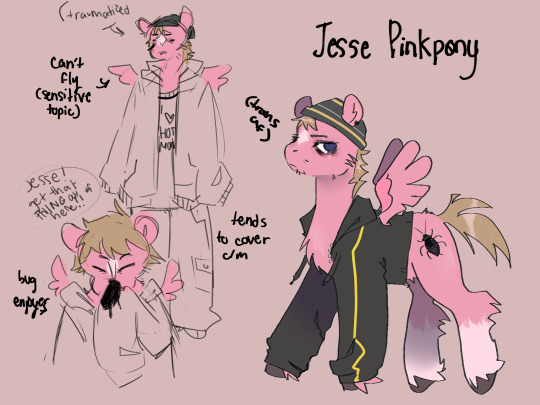
have fun figuring out how ironic this is
#jesse pinkman#jesse pinkpony#mlp#breaking bad#mlpxbreaking bad#my art#the cockroach c/m is on purpose i think iit represents his persistence and empathy in spite of everything#and i made him a slightly desaturated baker miller pink bc i think the (botched) studies behind it introduce some intresting concepts
95 notes
·
View notes
Text

bad news: im at it again
#just remembered this image lol#if you're wondering why i keep bringing up my communist theory studies#and joking about how everyone probably hates it and finds it exhausting#even though no one has ever expressed. any opinion about it whatsoever#its because i am genuinely and sincerely embarrassed#and framing it like its a quirky affectation instead of just. my irrepressible autism way#feels a little better i guess#if its a funny bit or if its a thing im doing to spite the haters then at least it's something im doing on purpose yknow?#so if someone could please get Big Mad about the communism that would really help support my premise thanks
29 notes
·
View notes
Text
Clad in Justice and Worth
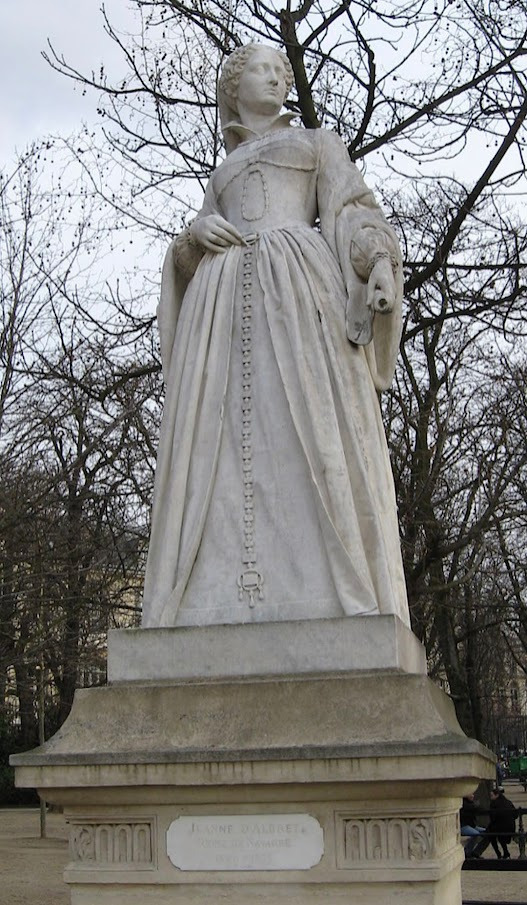
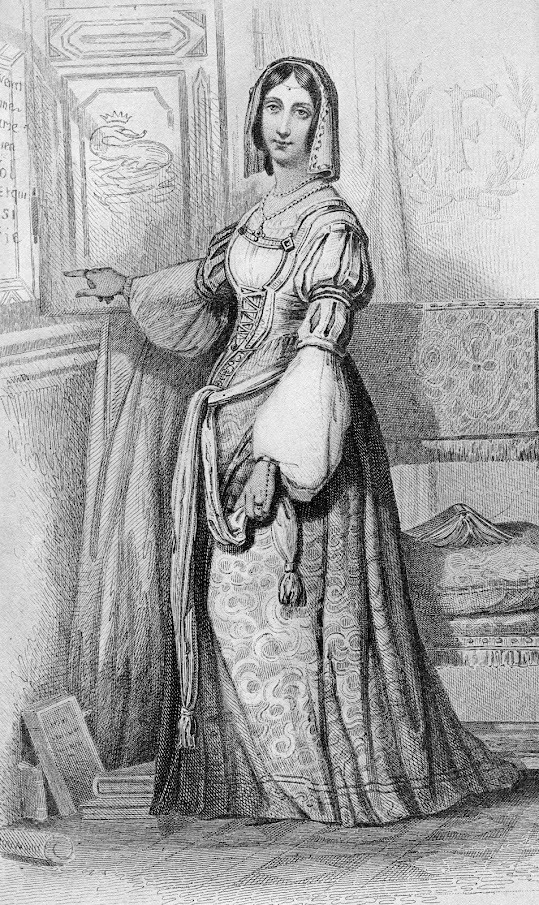
Written for the Inklings Challenge 2023 (@inklings-challenge). Inspired by the lives of Jeanne d'Albret and Marguerite de Navarre, although numerous liberties have been taken with the history in the name of introducing fantastical elements and telling a good story. The anglicization of names (Jeanne to Joan and Marguerite to Margaret) is meant to reflect the fictionalization of these figures.
The heat was unbearable, and it would grow only hotter as they descended into the lowlands. It was fortunate, Joan decided, that Navarre was a mountain country. It was temperate, even cold there in September. It would be sweltering by the sea.
The greater issue ought to have been the presence of Monluc, who would cut Joan’s party off at the Garonne River most like. The soldiers with whom she traveled were fierce, but Monluc had an entire division at the Garrone. Joan would be a prisoner of war if Providence did not see her through. Henry, perhaps, might suffer worse. He might be married to a Catholic princess.
Yet Joan was accustomed to peril. She had cut her teeth on it. Her first act as queen, some twenty years ago, had been to orchestrate the defense of her kingdom, and she was accustomed to slipping through nets and past assassins. The same could not be said of the infernal heat, which assaulted her without respite. Joan wore sensible travel clothing, but the layers of her skirts were always heavy with sweat. A perpetual tightness sat in her chest, the remnant of an old bout with consumption, and however much she coughed it would not leave.
All the same, it would not do to seem less than strong, so she hid the coughing whenever she could. The hovering of her aides was an irritant and she often wished she could just dismiss them all.
“How fare you in the heat, Majesty?”
“I have war in my gut, Clemont,” Joan snapped. “Worry not for me. If you must pester someone, pester Henry.”
He nodded, chastened. “A messenger is here from Navarre. Sent, I suspect, to induce you to return hence.”
“I would not listen to his birdcalls.”
“Young Henry said much the same.”
Joan stuffed down her irritation that Clemont had gone to Henry before he’d come to her. She was still queen, even if her son was rapidly nearing his majority. “Tell him that if the Huguenot leaders are to be plucked, I think it better that we all go together. Tell him that I would rather my son and I stand with our brothers than await soldiers and assassins in our little kingdom.”
Her aide gave a stiff nod. “At once, your Majesty.”
She would breathe easier when they reached the host at La Rochelle. Yet then, there would be more and greater work to do. There would be war, and Joan would be at the head of it.
*
When she awoke in the night, Joan knew at once that something was awry. It was cool. Gone was the blistering heat that had plagued them all day. Perhaps one of the kidnapping plots had finally succeeded.
Certainly, it seemed that way. She was in a cell, cool and dank and no more than six paces square. And yet—how strange! —the door was open.
Rising unsteadily to her feet, Joan crept towards the shaft of moonlight that fell through it. She glanced about for guards, but saw only a single prisoner in dirty clothes standing just beyond the threshold. He was blinking rapidly, as though the very existence of light bewildered him. Then, as Joan watched, he crept forward towards the gate of the jailhouse and out into the free air beyond. Joan listened for a long moment, trying to hear if there was any commotion at the prisoner’s emergence. When she could perceive none, she followed him out into the cool night air.
A lantern blazed. “Come quickly,” a voice hissed. “Our friend the Princess is waiting.”
The prisoner answered in a voice too quiet for Joan to hear. Then, quite suddenly, she heard his companion say, “Who is it that there behind you?”
The prisoner turned round, and Joan’s fingers itched towards her hidden knife. But much to her astonishment, he exclaimed, “Why, it is the lady herself! Margaret!”
But Joan had no opportunity to reply. Voices sounded outside her pavilion and she awoke to the oppressive heat of the day before. Coughing hard, Joan rolled ungracefully from her bed and tried to put away the grasping tendrils of her dream.
“The river is dry, Majesty” her attendant informed her as soon as she emerged from her pavilion, arrayed once again in sensible riding clothes. “The heat has devoured it. We can bypass Monluc without trouble, I deem.”
“Well then,” Joan replied, stifling another cough. “Glory to God for the heat.”
*
They did indeed pass Monluc the next day, within three fingers of his nose. Joan celebrated with Henry and the rest, yet all the while her mind was half taken up with her dream from the night before. Never, in all her life, had her mind conjured so vivid a sensory illusion. It had really felt cool in that jail cell, and the moonlight beyond it had been silver and true. Stranger still, the prisoner and his accomplice had called Joan by her mother’s name.
Joan had known her mother only a little. At the age of five, she had been detained at the French court while her mother returned to Navarre. This was largely on account of her mother’s religious convictions. Margaret of Angoulême had meddled too closely with Protestantism, so her brother the king had seen fit to deprive her of her daughter and raise her a Catholic princess.
His successor had likewise stolen Henry from Joan, for despite the king’s best efforts she was as Protestant as her mother. Yet unlike Margaret, Joan had gone back for her child. Two years ago, she had secretly swept Henry away from Paris on horseback. She’d galloped the horses nearly to death, but she’d gotten him to the armed force waiting at the border, and then at last home to Navarre. Sometimes, Joan wondered why her own mother had not gone to such lengths to rescue her. But Margaret’s best weapons had been tears, it was said, and tears could not do the work of sharp swords.
The Navarre party arrived at La Rochelle just before dusk on the twenty-eighth of September. The heat had faltered a little, to everyone’s great relief, but the air by the sea was still heavy with moisture. The tightness in Joan’s chest persisted.
“There will be much celebration now that you have come, Your Majesty,” said the boy seeing to her accommodations. “There’s talk of giving you the key to the city, and more besides.”
Sure enough, Joan was greeted with applause when she entered the Huguenot council. “I and my son are here to promote the success of our great cause or to share in its disaster,” she said when the council quieted. “I have been reproached for leaving my lands open to invasion by Spain, but I put my confidence in God who will not suffer a hair of our heads to perish. How could I stay while my fellow believers were being massacred? To let a man drown is to commit murder.”
*
Sometimes it seemed that the men only played at war. The Duke of Conde, who led the Huguenot forces, treated it as a game of chivalry between gentlemen. Others, like Monluc, regarded it as a business; the mercenaries he hired robbed and raped and brutalized, and though be bemoaned the cruelty he did nothing to curtail it.
There were sixty-thousand refugees pouring into the city. Joan was not playing at war. When she rose in the mornings, she put poultices on her chest, then went to her office after breaking her fast. There was much to do. She administered the city, attended councils of war, and advised the synod. In addition, she was still queen of Navarre, and was required to govern her own kingdom from afar.
In the afternoons, she often met with Beza to discuss matters of the church, or else with Conde, to discuss military matters. Joan worked on the city’s fortifications, and in the evenings she would ride out to observe them. Henry often joined her on these rides; he was learning the art of war, and he seemed to have a knack for it.
“A knack is not sufficient,” Joan told him. “Anyone can learn to fortify a port. I have learned, and I am a woman.”
“I know it is not sufficient,” the boy replied. “I must commit myself entirely to the cause of our people, and of Our Lord. Is that not what you were going to tell me?”
“Ah, Henry, you know me too well. I am glad of it. I am glad to see you bear with strength the great and terrible charge which sits upon your shoulders.”
“How can I help being strong? I have you for a mother.”
At night, Joan fell into bed too exhausted for dreams.
*
Yet one night, she woke once again to find her chest loose and her breathing comfortable. She stood in a hallway which she recognized at once. She was at the Château de Fontainebleau, the place of her birth, just beyond the door to the king’s private chambers.
“Oh please, Francis, please. You cannot really mean to send him to the stake!” The voice on the other side of the door was female, and it did not belong to the queen.
A heavy sigh answered it. “I mean to do just that, ma mignonne. He is a damned heretic, and a rabble-rouser besides. Now, sister, don’t cry. If there’s one thing I cannot bear, it is your weeping.”
At those words, a surge of giddiness, like lightning, came over Joan’s whole body. It was her own mother speaking to the king. She was but a few steps away and they were separated only by a single wooden door.
“He is my friend, Francis. Do you say I should not weep for my friends?”
A loud harumph. “A strange thing, Margaret. Your own companions told me that you have never met the man.”
“Does such a triviality preclude friendship? He is my brother in Our Lord.”
“And I am your true brother, and your king besides.”
“And as you are my brother—” here, Margaret’s voice cracked with overburdening emotion. She was crying again, Joan was certain. “As you are my brother, you must grant me this boon. Do not harm those I love, Francis.”
The king did not respond, so Joan drew nearer to the door. A minute later, she leapt backwards when it opened. There stood her mother, not old and sick as Joan had last seen her twenty years before, but younger even than Joan herself.
“If you’ve time to stand about listening at doors, then you are not otherwise employed,” Margaret said, wiping her tears from her face with the back of her hand. “I am going to visit a friend. You shall accompany me.”
Looking down at herself, Joan realized that her mother must have mistaken her for one of Fountainbleu’s many ladies-in-waiting. She was in her night clothes, which was really a simple day dress such as a woman might wear to a provincial market. Joan did not sleep in anything which would hinder her from acting immediately, should the city be attacked in the middle of the night.
“As you wish, Majesty,” Joan replied with a curtsey. Margaret raised an eyebrow, and instantly Joan corrected herself: “Your Highness.”
Margaret stopped at her own rooms to wrap herself in a plain, hooded cloak. “What is your name?” she asked.
“Joan, your Highness.”
“Well, Joan. As penance for eavesdropping, you shall keep your own counsel with regards to our errand. Is that clear?”
“Yes, your Highness,” Joan replied stiffly. Any fool could see what friend Margaret intended to visit, and Joan wished she could think of a way to cut through the pretense.
When Margaret arrived at the jail with Joan in tow, the warden greeted her almost like a friend. “You are here to see the heretic, Princess? Shall I fetch you a chair?”
“Yes, Phillip. And a lantern, if you would.”
The cell was nearly identical to the one which Joan had dreamed on the road to La Rochelle. Inside sat a man with sparse gray hair covering his chin. Margaret’s chair was placed just outside the cell, but she brushed past it. She handed the lantern to Joan and knelt down in the cell beside the prisoner.
“I was told that I had a secret friend in the court,” he said. “I see now that she is an angel.”
“No angel, monsieur Faber. I am Margaret, and this is my lady, Joan. I have come to see to your welfare, as best I am able.”
Now, Margaret’s hood fell back, and all at once she looked every inch the Princess of France. Yet her voice was small and choked when she said, “Will you do me the honor of praying with me?”
Margaret was already on her knees, but she lowered herself further. She rested one hand lightly on Faber’s knee, and after a moment, he took it. Her eyes fluttered closed. In the dim light, Joan thought she saw tears starting down her mother’s cheek.
When she woke in the morning, Joan could still remember her mother’s face. There were tears in her hazelnut eyes, and a weeping quiver in her voice.
*
Winter came, and Joan’s coughing grew worse. There was blood in it now, and occasionally bits of feathery flesh that got caught in her throat and made her gag. She hid it in her handkerchief.
“Winter battles are ugly,” Conde remarked one morning as Christmas was drawing near. “If the enemy is anything like gentlemen, they will not attack until spring. And yet, I think, we must stand at readiness.”
“By all means,” Joan replied. “Anything less than readiness would be negligence.”
Conde chuckled, not unkindly. “For all your strength and skill, madame, it is obvious that you were not bred for command. No force can be always at readiness. It would kill the men as surely as the sword. ‘Tis not negligence to celebrate the birth of Our Lord, for instance.”
Joan nodded curtly, but did not reply.
As the new year began, the city was increasingly on edge. There was frequent unrest among the refugees, and the soldiers Joan met when she rode the fortifications nearly always remarked that an attack would come soon.
Then, as February melted into March, word came from Admiral Coligny that his position along the Guirlande Stream had been compromised. The Catholic vanguard was swift approaching, and more Huguenot forces were needed. By the time word reached Joan in the form of a breathless young page outside her office, Conde was already assembling the cavalry. Joan made for the Navarre quarter at once, as fast as her lungs and her skirts would let her.
The battle was an unmitigated disaster. The Huguenots arrived late, and in insufficient numbers. Their horses were scattered and their infantry routed, and the bulk of their force was forced back to Cognac to regroup. As wounded came pouring in, Joan went to the surgical tents to make herself useful.
The commander La Noue’s left arm had been shattered and required amputation. Steeling herself, Joan thought of Margaret’s tearstained cheeks as she knelt beside Faber. “Commander La Noue,” she murmured, “Would it comfort you if I held your other hand?”
“That it would, Your Majesty,” the commander replied. So, as the surgeon brandished his saw, Joan gripped the commander’s hand tight and began to pray. She let go only once, to cover her mouth as she hacked blood into her palm. It blended in easily with the carnage of the field hospital.
Yet it was not till after the battle was over that Joan learned the worst of it. “His Grace, General Conde is dead,” her captain told her in her tent that evening. “He was unseated in the battle. They took him captive, and then they shot him. Unarmed and under guard! Why, as I speak these words, they are parading his corpse through the streets of Jarnac.”
“So much for chivalry,” murmured Joan, trying to ignore the memories of Conde’s pleasant face chuckling, calling her skilled and strong.
“We will need to find another Prince of the Blood to champion our cause,” her captain continued. “Else the army will crumble. If there’s to be any hope for Protestantism in France, we had better produce one with haste. Admiral Coligny will not serve. He’s tried to rally the men, to no avail. In fact, he has bid me request that you make an attempt on the morn.”
“Henry will lead.”
“Henry? Why, he’s only a boy!”
Joan shook her head. “He is nearly a man, Captain, and he’s a keen knack for military matters. He trained with Conde himself, and he saw to the fortification of La Rochelle at my side. He is strong, which matters most of all. If it’s a Prince of the Blood the army requires, Henry will serve.”
“As you say, Majesty,” said her captain with a bow. “But it’s not me you will have to convince.”
*
Joan settled in for a sleepless night. Her captain was correct that she would need to persuade the Huguenot forces well, if they were to swear themselves to Henry. So, she would speak. Joan would rally their courage, and then she would present them with her son and see if they would follow him.
Page after page she wrote, none of it any good. Eloquence alone would not suffice; Joan’s words had to burn in men’s chests. She needed such words as she had never spoken before, and she needed them by morning.
By three o’clock, Joan’s pages were painted with blood. Her lungs were tearing themselves to shreds in her chest, and the proof was there on the paper beside all her insufficient words. She almost hated herself then. Now, when circumstance required of her greater strength than ever before, all Joan’s frame was weakness and frailty.
An hour later, she fell asleep.
When Joan’s eyes fluttered open, she knew at once where she was. Why, these were her own rooms at home in Navarre! Sunlight flooded through her own open windows and drew ladders of light across Joan’s very own floor. Her bed sat in the corner, curtains open. Her dressing room and closet were just there, and her own writing desk—
There was a figure at Joan’s writing desk. Margaret. She looked up.
“My Joan,” she said. It started as a sigh, but it turned into a sob by the end. “My very own Joan, all grown up. How tired you look.”
The words seemed larger than themselves somehow. They were Truth and Beauty in capital letters, illuminated red and gold. Something in Joan’s chest seized; something other than her lungs.
“How do you know me, mother?”
“How could I not? I have been parted from you of late, yet your face is more precious to me than all the kingdoms of the earth.”
“Oh.” And then, because she could not think of anything else to say, Joan asked, “What were you writing, before I came in?”’
“Poetry.” Joan made a noise in her throat. “You disapprove?” asked her mother.
“No, not at all. Would that I had time for such sweet pursuits. I have worn myself out this night writing a war speech. It cannot be poetry, mother. It must be wine. It must–” then, without preamble, Joan collapsed into a fit of coughing. At once, her mother was on her feet, handkerchief in hand. She pressed it to Joan’s mouth, all the while rubbing circles on her back as she coughed and gagged. When the handkerchief came away at last, it was stained red.
“What a courageous woman you are,” Margaret whispered into her hair. “Words like wine for the soldiers, and yourself spitting blood. Will you wear pearls or armor when you address them?”
“I will address them on horseback in the field,” answered Joan with a rasp. “I would have them see my strength.”
Her mother’s dark eyes flickered then. Margaret looked at her daughter, come miraculously home to her against the will of the king and the very flow of time itself. She was not a large woman, but she held herself well. She stood brave and tall, though no one had asked it of her.
Her own dear daughter did not have time for poetry. Margaret regretted that small fact so much that it came welling up in her eyes. “And what of your weakness, child? Will you let anyone see that?”
Joan reached out and caught her mother’s tears. Her fingertips were harder than Margaret’s were. They scratched across the sensitive skin below her eyes.
“Did I not meet you like this once before? You are the same Joan who came with me to the jail in Paris once. I did not know you then. I had not yet borne you.”
“Yes, the very same. We visited a Monsieur Faber, I believe. What became of that poor man?”
Margaret sighed. She crossed back over to the desk to fall back into her seat, and in a smaller voice she said, “My brother released him, for a time. And then, when I was next absent from Paris, he was arrested again and sent to the stake before I could return.”
“I saw you save another man, once. I do not know his name. How many prisoners did you save, mother?”
“Many. Not near enough. Not as many as those with whom I wept by lantern light.”
“Did the weeping do any good, I wonder.”
“Those who lived were saved by weeping. Those who died may have been comforted by it. It was the only thing I could give them, and so I must believe that Our Lord made good use of it.”
Joan shook her head. She almost wanted to cry too, then. The feeling surprised her. Joan detested crying.
“All those men freed from prison, yet you never came for me. Why?”
“Francis was determined. A choice between following Christ and keeping you near was no choice at all, though it broke my heart to make it.”
If Joan shut her eyes, she could still remember the terror of the night she had rescued Henry. “You could have come with soldiers. You could have stolen me away in the night.”
Margaret did not answer. The tears came faster now and her fair, queenly skin blossomed red. So many years would pass between the dear little girl she’d left in Paris and the stalwart woman now before her. She did not have time for poetry, but if Margaret had been allowed to keep her that would have been different. Joan should have had every poem under the sun.
“Will you read it?” she asked, taking the parchment from her desk and pressing it into her daughter’s hands. “Will you grant me that boon?”
Slowly, almost numbly, Joan nodded. To Margaret’s surprise, she read aloud.
“God has predestined His own
That they should be sons and heirs.
Drawn by gentle constraint
A zeal consuming is theirs.
They shall inherit the earth
Clad in justice and worth.”
“Clad in justice and worth,” she repeated, handing back the parchment. “It’s a good poem.”
“It isn’t finished,” replied her mother.
Joan laughed. “Neither is my speech. It must be almost morning now.”
As loving arms closed around her again, Joan wished to God that she could remain in Navarre with her mother. She knew that she and Margaret did not share a heart: her mother was tender like Joan could never be. Yet all the same, she wanted to believe that they had been forged by the same Christian hope and conviction. She wanted to believe that she, Joan, could free the prisoners too.
She shut her eyes against her mother’s shoulder. When she opened them, she was back in her tent, with morning sun streaming in.
*
She came before the army mounted on a horse with Henry beside her. Her words were like wine when she spoke.
“When I, the queen, hope still, is it for you to fear? Because Conde is dead, is all therefore lost? Does our cause cease to be just and holy? No; God, who has already rescued you from perils innumerable, has raised up brothers-in-arms to succeed Conde.
Soldiers, I offer you everything in my power to bestow–my dominions, my treasures, my life, and that which is dearer to me than all, my son. I make here a solemn oath before you all, and you know me too well to doubt my word: I swear to defend to my last sigh the holy cause which now unites us, which is that of honor and truth.”
When she finished speaking, Joan coughed red into her hands. There was quiet for a long moment, and then a loud hurrah! went up along the lines. Joan looked out at the soldiers, and from the front she saw her mother standing there, with tears in her eyes.
#inklingschallenge#inklings challenge#team tolkien#genre: time travel#theme: visiting the imprisoned#with a tiny little hint of#theme: visiting the sick#story: complete#so i like to read about the reformation in october when i can#when the teams were announced i was burning through a book on the women of the reformation and these two really reached out and grabbed me#Jeanne in particular. i was like 'it is so insane that this person is not more widely known.'#Protestantism has its very own badass Jeanne/Joan. as far as i'm concerned she should be as famous as Joan of Arc#so that was the basis for this story#somewhere along the line it evolved into a study on different kinds of feminine power#and also illness worked itself in there. go me#anyway. hopefully my catholic friends will give me a shot here in spite of the protestantism inherant in the premise#i didn't necessarily mean to go with something this strongly protestant as a result of the Catholic works of mercy themes#but i'm rather tickled that it worked out that way#on the other hand i know that i have people following me that know way more about the French Wars of Religion and the Huguenots than i do#hopefully there's enough verisimilitude here that it won't irritate you when i inevitably get things wrong#i think that covers all my bases#i am still not 100% content with how this turned out but i am at least happy enough to post it#and get in right under the wire. it's a couple hours before midnight still in my time zone#pontifications and creations#leah stories#i enjoy being a girl#the unquenchable fire
50 notes
·
View notes
Text


so i was assuming i would get used to aesprite by just palette swapping preexisting pokemon sprites lol. oops
#tmos makes art#dragalge#pokemon#there are parts of this i might touch up later tbh but! real damn good for a finished first attempt as far as im concerned lol#will probably study more of the older spites; thinking i JUST hit the mark on doing a little extra dithering than needed?#and theres some lines i absolutely could have still thinned + did some more colored pixels on lol
26 notes
·
View notes
Text
studying like my life depends on it, because my life depends on it
#academic validation#academicism#studyspo#studyblr#spiteful studying#student problems#chaotic academia#academia#academic#desi academia#indian academia#dark academism#light academia#academic struggles#academic assignments#academic help#Academic pressure
278 notes
·
View notes
Text
Silco, Vander, and Grace for the Ones Who Hurt Us the Most
Sometimes I feel like we all really need to sit with the fact that Silco was ready, willing, and wanting for Vander to return to his side after Vander tried and failed to kill him. What Vander did was a genuine life altering act of betrayal that Silco had to live with the mental, emotional, and medical consequences for years after. You can bet if Jinx hadn't shot Silco, the river toxins would've gotten him just a little later. And in spite of the ways Vander's actions ruined his life, that Vander admits to even (but doesn't apologize for), Silco rationalized it just as much for Vander as he did himself.
Silco decided that the man he loved the most nearly killed him (and in a way is still killing him) for a greater purpose, which didn't make everything okay, but it made it reasonable. And this rationalization has bled into every aspect of his life because the way Silco treats Zaun is the way he treats himself. If you're weak the people who love you and you love back will hurt you. They are right to permanently alter the trajectory of your existence to make the right calls, because as long you survive it, you will be stronger. He's made Shimmer the lifeblood of Zaun, because Silco is literally dependent on it to live as well. It works for him, so it works for Zaun.
The most warped part is, Silco was mostly right! He had violent rise in Zaun and completely changed the course of its development. Yet he managed to create a Zaun that couldn't be cowed or bullied either economically or militarily by Piltover the way it was in the past. I can't help but think how it all must twist and burn, because if Silco understood he was succeeding at the impossible, then doesn't that mean it all reinforced his logic around Vander? That this man you loved hurt you in a way that can't be taken back for the rest of your life, and he was right to do it? So that means Silco was right to change, to want to be back by Vander's side, because he was the one who needed to reinvent himself to be worthy of control, right?
No matter the success Silco reaped he had to recognize the dissonance between this logic and reality, because despite the bastard he could be, Silco would never do any of what was done to him onto Jinx. Sure Silco would simulate his traumas into life lessons and heavily sanitized rituals, but he never betrayed her or abandoned her when she became detriment to his position. Obviously Vander also never gave up on his kids either (#cinematicparallels), but we don't know if Silco was ever in a position to betray someone the way Vander did him, or if he ever wanted to prior to it. So even as Silco recognizes that Vander changed to protect the children he loves so much, he must wonder if the way Vander and he loved eachother just wasn't it enough? If the way Silco cared for Vander was reciprocal, a deep love whether romantic or platonic, then why wasn't Silco afforded a similar grace to stay by his side?
Silco had to live with all these contradictions and still chose to embrace Vander's memory. In a complete contrast to Vander, Silco didn't obscure who Vander was to Zaun politically or personally. Silco allowed a statue of Vander to stand, and went to it for comfort, he regularly talked about his life with Vander before and after the betrayal with Jinx. Meanwhile, from what the audience can see, Silco's presence was almost fully hidden from the newest generation sans the scar Silco gave him, which Vander hides with a bracer. All I can end up thinking is that must be easier for Silco to keep loving Vander like this, it's how he gives himself the grace for it.
#arcane#silco#vander arcane#silco and vander#zaundads#arcane meta#these guys are absolutely the most#sometime i think silco would love if Vander's showed up by his window wh style#seriously tho#they way silco just rationalized Vander's betrayal FOR vander needs to be studied#even jinx makes a face when she'd hear his stories#like c'mon man#silco still loving vander in spite of the betrayal but this care contradicts the “perspective” of Silco’s new outlook on life#and yet he finds a way becuz he's a hypocrite that will gladly turn his philosophy into the weirdest pretzel#just say you were hurtand he sucks for that#like damn
23 notes
·
View notes
Text
Someone explain to me why Jason feels more Bruce's son than any of the others. Especially considering Jason would have lived and thrived with any parent except Bruce.
Maybe because Bruce is only a father figure to Dick and Tim‚ who loved and preferred their own fathers. Damian's Dad is Dick (I will not be taking questions). Cass wanted Bruce to be her father so bad but he just wouldn't. Even the belated adoption was mere formality. But Jason? He probably did love Willis but he adored Bruce, and Bruce adored him back. I don't think he loved him more than Dick, who will always be his favourite because he was his first partner and child, and because of all the ways he isn't like Bruce. But Bruce and Jason were always father and son without any of the complexity between Bruce and the others.
And Jason is so like Bruce. Everyone says Tim is most like him because of the way their brains work, but it's Dick who actually has been moulded into Batman-lite. Damian is his mother's child; always craving connection and acceptance to anchor him within his inner tempest. He'd die in the kind of darkness Bruce enshrouds himself in. Cassandra has Bruce's drive and focus and inability to conceive of herself as person outside of the mission (although lbr they're all like that. Sigh) But her open compassion, unguarded empathy and playfulness characterizes her more than even Dick.
Jason, otoh, is a thing that will grab a sword by the blade and cut himself to the bone forcing it back. His light and darkness are one and the same. He's the one who can match Bruce's fear and fury and hubris that tries to bend the world into the shape of his choosing with his bare hands.
Idk why I hate Bruce and love Jason. They're both equally myopic and hypocritical and selfish‚ as unable to see past their own trauma, as lacking in self-awareness. Maybe because Jason's just a boy who needs someone on his side while Bruce has too many on his. Maybe because he was born and raised among the people he wants to protect, unlike Bruce, and has so much more excuse for being the way he is. Maybe because he never takes himself so seriously, and uses his sense of humour just like Dick and Steph do, just in an entertainingly assholish fashion.
But if any child could have been biologically Bruce's it would be Jason. Which probably lies at the heart of their eternal conflict. Neither of them will give, neither will blink first. Two men made to forever burn alive.
#bruce and jason#bat meta#jason todd meta#bruce wayne meta#relationship study#jason todd#spite waffle#anti bruce wayne
406 notes
·
View notes